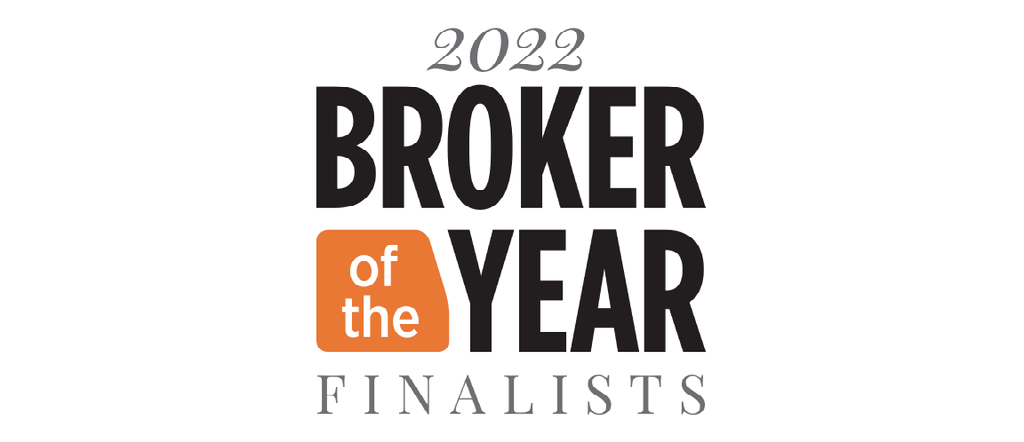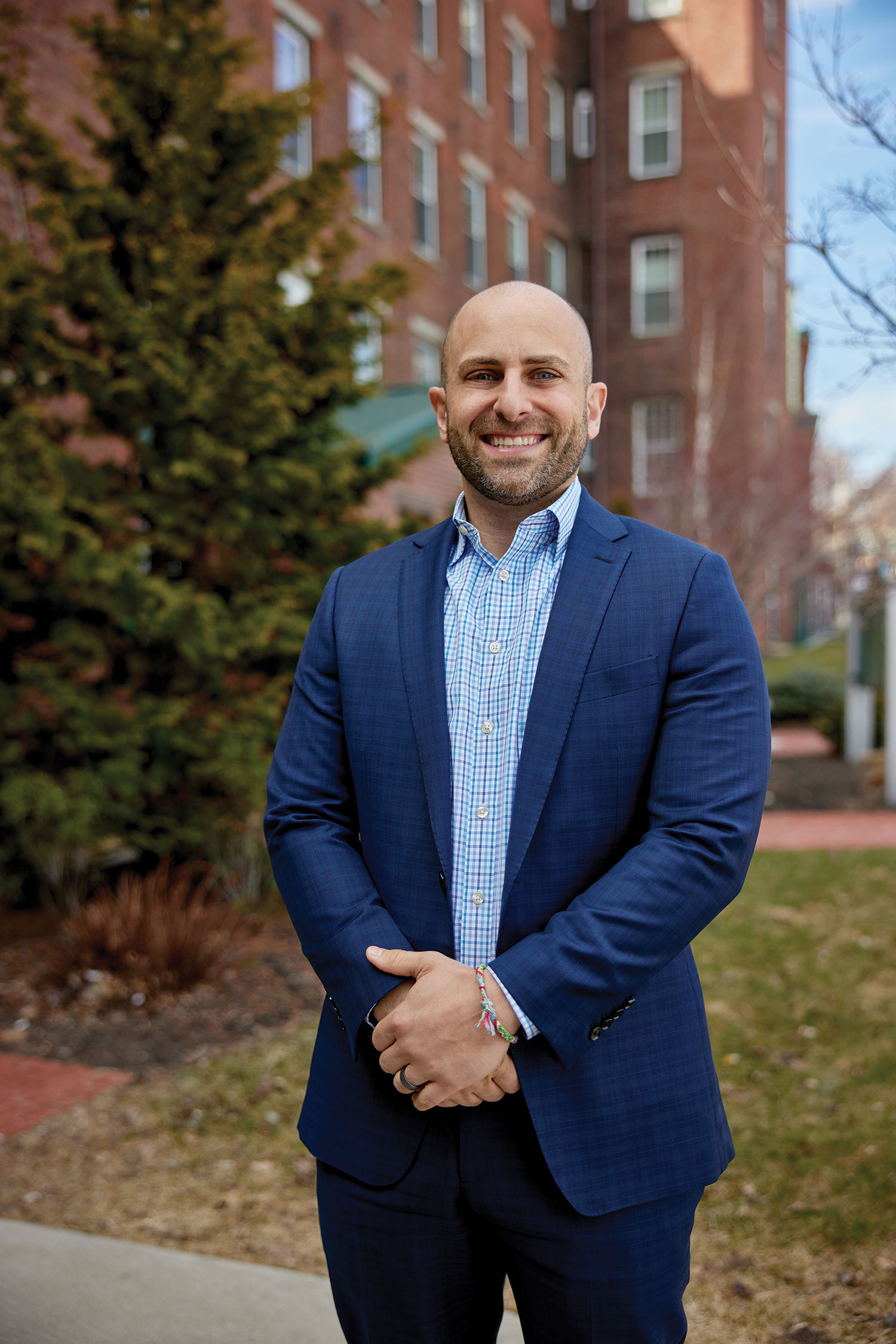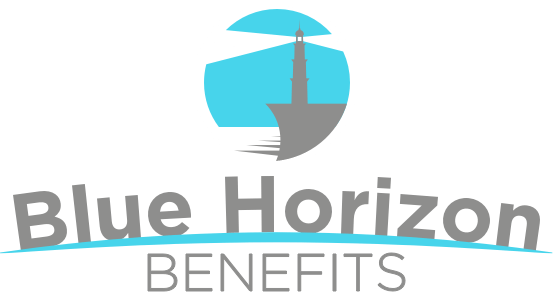Braden Monaco
As a founder of Blue Horizon he helps clients address immediate needs while developing a long-term view of benefits.

By Dan Cook // Photography by Ken Richardson
Braden Monaco grew up in a blue-collar, entrepreneurial family, where “Do the right thing and the rest will follow” was ingrained into him.
After college, he found his way into the insurance industry, working for others who practiced a more traditional, revenue-driven brokerage model. The experience taught him the basics, but he soon became disillusioned with the low-touch client approach. “Do the right thing” was not happening to his satisfaction.
“I could see the agency’s brokers were not trying to be of service to our clients every day. That’s what I wanted to do. Then I saw consolidation happening in the industry. At that point my wife was pregnant with our second daughter and I took the plunge.”
With two trusted partners, Andrea Flynn and Chris Morin, he returned to his entrepreneurial roots in 2016 and founded Blue Horizon Benefits, a concierge-style consulting firm.
“Between myself, my partners, and our team, we had everything we needed to be successful. I knew we had strong relationships that would support us during the startup period. And I knew we could be a leader in our industry by always acting in true partnership with our clients.”
His business would be much more than insurance consulting. “If every day I woke up and just focused on insurance, I would not be doing this anymore. The passion lies in helping employers and employees navigate a complicated industry by reducing costs and simplifying things for people.”
The company differs from others with its heavy emphasis on technological solutions for clients. The emerging human resources platforms, apps, and software programs remove burdensome tasks from the owner’s shoulders while also creating efficiencies throughout the client organization.
First and foremost, though, Blue Horizon creates an individual benefits package for each company they work with, understanding that many organizations are looking for consistent, positive changes instead of a wholesale re-imagining of how benefits are delivered.
“In many cases, we have to provide better benefits because the client is losing talent,” Monaco says. “The owner may not have cost savings as a top priority when they are struggling to attract top talent. Not all my clients want the innovative solutions to reduce health care costs by 20%, they just want the brand name carrier and far more support than they’re used to receiving from a broker.”
Planning ahead
Blue Horizon’s technology solutions are designed to address immediate benefits matters and improve efficiencies with the company for savings that will be realized in the future.
Monaco has a construction company client with about 170 employees that came into his fold with immediate needs.
“They had an office manager who was part-time and who was not well-versed in all it took to smoothly run an HR department. As a result, the company was struggling to create systems that were consistent.”
Employees’ first impressions of the company weren’t always positive, and that was hindering recruiting. The solution: technology consulting/cultural analysis.
“We helped create new onboarding policies, and we streamlined the process with new technology. Tech-wise, it was low-hanging fruit. We don’t charge for it and we can easily support them through it.”
The new tech-backed policies and processes eased the hiring pain. The next step was to simplify benefit offerings to meet employee needs. Employees had to choose between several plans, which sometimes resulted in confusion, poor choices, and low scores for the benefits package.
“We said, ‘Let’s pick two plans’—it just made more sense. One for the heavy and one for the light consumer. We met one-on-one with plan members to help guide them to a plan that made sense. It was not only better from an enrollment perspective, it helped us learn how this company uses health care. As we think about cost control measures, we must consider the consumer experience, how they are using it, and what the impact is.”
Monaco was able to move members to higher-deductible plans funded by the company (mainly through cost savings) that froze employee contributions at the years-earlier levels. The focus became understanding employer tolerance for change in the short term and ultimately helping them understand what a medical plan in the future might look like.
Blue Horizon takes the same approach with prescription drugs. Offer a plan, track the results, refine as the data comes in. Meantime, by tracking hospital performances, Blue Horizon can build a local network of high-quality doctors where plan members receive service at a reduced cost.
“As you get more data on the workforce, you can start to identify where the waste is and where the sweet spots for savings are,” he says.
“It’s a marathon to educate people, study the data and change it over time. It is important for employers to understand there is a path to making change if they are ready at any given moment. It does not always have to be now or never.”

Partner to partners
Self-funding is the key to understanding the cost/investment a benefits plan represents, Monaco says. But he’s not going to insist that a client move to self-funding until they fully understand what that means.
One of his clients is Dr. Mark Allara’s medical practice in Middletown, Massachusetts, which has some 25,000 patients. Allara is co-founder of AllaraCare, a health care platform provider, with Curtis Davis, an entrepreneur, serial startup founder, and executive coach.
Monaco has a role with both organizations: advisor to the practice’s plan, and advisory board member/consultant/plan distributor and implementer for AllaraCare.
“Braden helped us find the right partners when we began to explore creating a better design for our health plan,” says Davis. AllaraCare’s services save their customers about 20% on their plan investments once they are engaged through steerage to the best decisions on their health care. That process, Davis says, can lead to another 20% on the back end of plan spending.
Monaco partners with AllaraCare in various ways. With one of AllaraCare’s manufacturing clients, Monaco met one-on-one with plan members and administrators to implement Allara’s basic benefits package.
“He went down there to the company with his team and introduced the plan to them,” Davis said. “In that capacity, Blue Horizon acts as a distributor of our product.”
Active participation
Monaco likes to dive into community activities as well. The hard part is choosing how to divide those precious hours away from work between his family and his family-owned CrossFit gym.
Monaco is also on the corporate board for the YMCA of the North Shore. “It’s not just about gym and swim. It offers affordable housing, after school care and summer education programs. I’m trying to get younger people involved who can bring a fresh eye to marketing, branding, and social media so more people know about the amazing things this organization does in our community.”
Overall, Braden has made a commitment to helping people understand the impact living and maintaining a healthy life has on the great good of society. “The key to lower health care costs is a healthier population. The more we focus on educating people to live healthier lives, the easier the task will be to combat the ever-rising costs of care and insurance. ”



